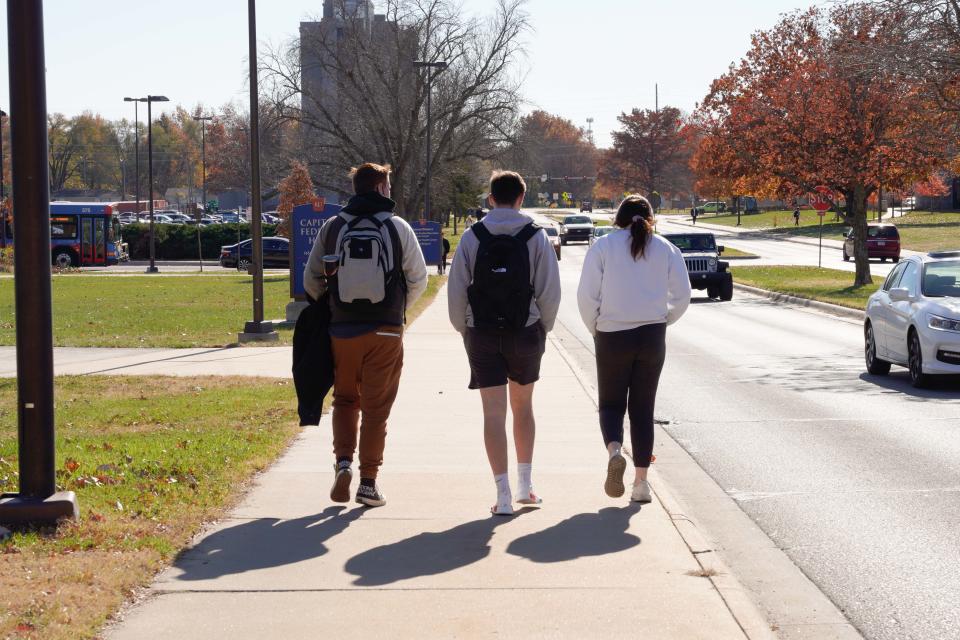Some Kansas Republicans are upset as KU cuts ACT test from admissions requirements. Here's why.

Some Republican lawmakers aren't happy that the University of Kansas will no longer require the ACT test as part of admissions.
While the Kansas Board of Regents already approved the university's request months ago, legislators voiced concern when reviewing regulatory changes from the regents.
The legislators suggested that KU was lowering its academic standards in order to raise enrollment numbers and feed administrative salaries at the expense of student debt. They also suggested it shows a failure in the state's K-12 public education system.
The comments came at a Joint Committee on Administrative Rules and Regulations meeting this month when discussing a regents plan to revoke 25 regulations, amend 13 existing regulations and create five new ones. The changes are related to KU admissions criteria, most notably the elimination of the ACT test requirement for guaranteed admission
"We're just trying to lower barriers," KU Chancellor Doug Girod told reporters after an unrelated regents meeting.
"What matters to us: Are people successful? Can they retain and can they graduate? And if they can do that, we want them at KU," Girod said. "We're going to be watching that really closely as we've changed some of our criteria to see how that plays out through retention and graduation rates."
More: 'Schools are becoming weary of the fight' on masks as Kansas children begin COVID vaccinations
KU putting emphasis on high school grade point average

Previously, high school seniors needed either a 21 on the ACT and a 3.25 GPA or a 24 on the ACT with a 3.0 GPA to get into KU.
Now, seniors would get into the university without taking the ACT as long as they have a 3.25 GPA. If the student has at least a 21 on the ACT, their GPA can be as low as 2.0 in order to get guaranteed admission to KU.
Colleges have been moving away from test scores as a primary driver of admissions, especially as the pandemic caused widespread disruptions to testing. The change puts KU in line with the five other state universities, for which the regents had already approved similar changes.
"We're not putting barriers that aren't helpful in the way of students being eligible for admission to the state universities," KBOR general counsel Julene Miller told the legislators.
The regents previously removed a requirement for specific curriculum, which turned out to be burdensome for some schools with less resources to match, Miller said. The curriculum rule also hurt out-of-state enrollment.
"It sounds like we're making everything a little easier to get into schools," said committee chairperson Rep. Barbara Wasinger, R-Hays.
"(It) would allow more eligibility for more students," Miller replied.
Wasinger, who is also the vice chairperson of the House Committee on Higher Education Budget, pointed to the state's public school system.
"You're already having problems with students with remedial classes because they're not being taught correctly K-12," she said. "So are we lowering the standards? ... If you set the bar low, that's all you're going to get."
"I want kids educated," she continued. "I want them all to succeed. I want good taxpaying Kansans, believe me. But when we keep lowering things, who are we letting off the hook here? Are we letting K-12 get away with things?"
More: 'I brought you a Christmas tree': Santa delivers holiday cheer to governor's mansion in Topeka
GPA more indicative of 'the student's heart and work ethic'
Daniel Archer, KBOR vice president of academic affairs, said educators have realized that certain requirements are not the best determinants of success.
"One of the big things in terms of shifts that you've seen in higher education historically, particularly in the '90s there was a big trend nationally, to put all your eggs in one basket and to look solely on ACT score," Archer said. "As time has gone on, there have been study after study that has shown that a high school GPA is actually a better predictor."
The ACT is still a good predictor, he said, "but a high school GPA is a little bit more indicative of the student's heart and work ethic."
Studies suggest a 21 ACT score shows a student is ready for college in core subjects, Archer said. The 3.25 GPA comes from a previous regents study for Kansas State University admissions requirements, which determined that grade point average threshold by comparing high school GPA to retention from first year to second year of college.
"I'm still concerned," said Sen. Kellie Warren, R-Leawood. "Are we just lowering the standards, making it easier so that we have more students who can feed the cost of the administrators at our universities and colleges without the success that these students are likely to have?"
Warren pointed to a growing number of administrators in relation to student class sizes.
"I'm concerned that we're getting rid of all objective criteria in looking at admissions for our colleges and universities," Warren said, questioning whether a GPA is comparable among schools. "Are we just creating student debt for these students with not as great chance of success based on their ACT score and their cumulative GPA?"
Archer said studies have shown the high school GPA is a better predictor of success, regardless of where the student is from.
"That's definitely been shown time and time again," he said.
Sen. Oletha Faust-Goudeau, D-Wichita, said both of her daughters did well in school, but one struggled with the pressure of tests. Both went on to graduate from Kansas colleges.
Archer said that was a good example of how students with a strong work ethic can overcome academic deficiencies.
"Rather than relying on one test of one day, looking at a GPA a four-year body of work," Archer said. "It's far more encompassing and covers multiple subjects."
Kansas legislators ask if KU seeking enrollment boost

Rep. Paul Waggoner, R-Hutchinson, noted declining college enrollment in Kansas.
"Is this designed to counteract that, to be able to increase the size of your freshman class?" he asked.
Miller said she didn't think that was the intention.
The university may see an enrollment boost, according to regents documents, but there is no economic impact estimate on the regulations because of the abundance of other factors in a student's decision on whether and where to attend college.
Sen. Caryn Tyson, R-Parker, said KU officials previously raised their admissions standards because "they wanted to be an elite university in Kansas. So I find it somewhat conflicting that they're coming back to us today asking to lower those standards."
"It's disappointing that our universities are putting money and dollar signs above actual students' education," Tyson said.
She said anonymous educators have told her they are "extremely upset at the remedial classes" required for college students, pointing to the cost for taxpayers.
"They don't want to artificially keep students out of the state universities who really will be fine and do well," Miller said. "They also don't want to admit students who aren't going to do well. They are concerned about the student debt load."
KU says it's trying to balance opportunities
University administrators are trying to balance providing opportunities to students with other concerns, she said.
"It's not that they're trying to make this easier just so we get more students in at the risk of them not succeeding and not being able to pay for it," she said.
Girod, the university chancellor, said after the meeting that the decision was primarily based on the pandemic year making it difficult to take the ACT.
"I don't buy that," he said in reaction to accusations of lower standards. The ACT "disadvantages some groups as well, as all standardized tests do."
The Board of Regents is holding a hearing on the regulations on Dec. 14 in Topeka.
Jason Tidd is a statehouse reporter for the Topeka Capital-Journal. He can be reached by email at jtidd@gannett.com. Capital-Journal reporter Andrew Bahl contributed reporting.
This article originally appeared on Topeka Capital-Journal: KU cutting ACT from admissions requirement frustrates Kansas lawmakers

